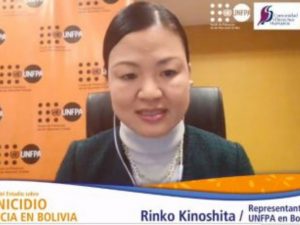Rinko Kinoshita Keeps Priorities in Focus During the Pandemic
September 24, 2021
Gillings School of Global Public Health

Rinko Kinoshita shares a presentation as a representative of the UNFPA in Bolivia.
What’s your role in public health?
I am currently the representative of the United Nations Population Fund (UNFPA) for Bolivia.
Can you describe your focus in one sentence?
As the United Nations’ sexual and reproductive agency, we work to achieve three “transformative results” — 1) zero preventable maternal deaths; 2) zero gender-based violence and harmful practices such as child marriage; and 3) zero unmet needs for family planning or contraception.
The World Health Organization definition of women with unmet needs includes those who are fecund and sexually active but are not using any method of contraception and who report not wanting any more children or wanting to delay the next child. The concept of unmet needs points to the gap between women’s reproductive intentions and their contraceptive behavior.
What brought you to public health?
I am a nurse midwife by training. After working in a maternity hospital in Tokyo, I decided to attend the Gillings School to get a master’s degree in global maternal and child health. I was very affected on a trip to Bangkok where I saw huge disparities: Just next to skyscrapers, people were living in informal urban dwellings in a riverside area that was extremely congested and had sanitation problems.
How have you pivoted in your response to the coronavirus pandemic?
When the coronavirus started, my family had just moved from Burkina Faso to Senegal, where I worked with UNICEF (another United Nations agency working on child rights). I acted as the interim senior partnerships adviser at their regional office for West and Central Africa, which covers 24 countries. It was a “stretch assignment,” where the organization provides staff an opportunity to get experience in higher-level positions to learn and develop new skills. It was initially planned for three months, but I ended up staying in the role twice as long. My priority was to contribute to the team’s effort in helping country offices in the region quickly and strategically build partnerships and mobilize resources for the COVID-19 response with existing and emerging partners/donors. For example, I facilitated development of multi-country proposals, practical guidance notes, investment cases, and supported country offices in sharing lessons learned from initial partnerships during the pandemic.
In September of 2020, we moved to Bolivia, where UNFPA has been working to ensure that vital public health measures — especially, sexual and reproductive health (SRH) services and prevention and responses to gender-based violence — continued amidst the pandemic. In many countries, including Bolivia, these services have been scaled down as priorities shifted in response to the global public health crisis of COVID-19, which led to a rapid increase in unintended and adolescent pregnancies, increased home births, reduced attendance to antenatal care and other SRH services. In particular, adolescents decreased their utilization of contraceptives and experienced increased maternal mortality.
During the pandemic, lockdowns led to long school closures, economic crises, loss of employment and reduced social support systems, which all worked together to increase women and girls’ risk of experiencing domestic violence. Reporting and monitoring gender-based violence, and providing services to women and girls who were affected by violence, were also challenging. We have worked to ensure the continuity of these services, develop communications around violence prevention and reporting, and bring multi-sectoral services (e.g., justice, health and education) closer to those most affected.
Finally, together with partners — such as civil society organizations — we advocated that the government put these neglected issues back on the social agenda as essential services. While our office normally does not provide much in the way of supplies, in 2020 we procured more than $1 million of personal protective equipment for service providers (e.g., health personal and justice operators) to ensure that they were protected while providing much needed SRH services.
During the pandemic, many restrictions have forced us think outside the box. For example, in rural areas, we provided psychosocial and SRH counseling sessions to adolescents via WhatsApp. Many capacity development activities were converted into online certification courses: For example, health personnel, judges and justice operators can now complete some trainings online. Through United Nations interagency collaboration, we also are supporting the government with communication campaigns to promote COVID-19 vaccination, especially in indigenous rural communities on the border with Brazil.
Who are you when you’re at home?
I live in La Paz, Bolivia, with my family. It is the highest altitude city in the world. The airport is around 4,060 meters above sea level. Bolivia is a beautiful country with great biodiversity, from mountains to lakes and from highland to tropical climates. I look forward to discovering this country after the pandemic.
At home, I am a working mom of two beautiful daughters who are 11 and three years old. At the same time, I am a part-time doctoral student in my final year of studies. My doctoral research focuses on gender norms and socialization among early adolescents ages 10–14 years old, and I am trying to learn how they build these norms and how the gender norms affect their sexual and reproductive health — such as with violence and pregnancy avoidance in urban impoverished areas in Cape Town, South Africa.
During my free time, I enjoy going for a walk, doing yoga and watching documentaries.
